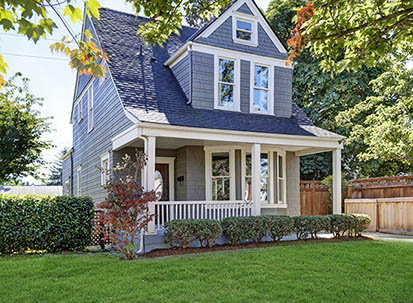One of the best things about owning a home is building equity. Equity is the portion of your home’s value that belongs to you. When you first buy your home, you put down some amount of money as a down payment. At that point, that is your equity.
As time goes on, your equity grows in two ways: Your mortgage balance declines as you make payments, and the value of your property increases. Your equity soars, increasing your net worth. Unless …
 |
|
|
Sometimes homeowners find themselves in a negative equity position, meaning that they owe more money on their mortgages than their homes are worth.
Upside-Down Mortgage: How Does It Happen?
It can happen in two different ways: The value of your home must decline, or the balance of what you owe the bank must increase. Both seem unlikely, but they can happen.
Declining Property Value
How can your property value go down? It happens, as it did during the 2008 financial collapse. In many areas of the country, property values went down by 50 percent or more. If you had just purchased a property with a 10 percent down payment, it doesn’t take common core math to see that you’ll owe more than the property is now worth – you’ll have negative equity.
Your property value can decrease for other reasons, too. External factors sometimes bring down your value, too. For instance, when large manufacturers – such as automobile or steel companies – close down plants, the value of homes throughout the entire city can drop. A land use change, such as a freeway being planned on the border of a neighborhood, can diminish desire for an area and negatively affect property values.
Even you can damage your home’s appeal, by not maintaining it or making ill-advised “improvements” to your home.
If the value of your home declines below what you owe on it, you will have negative equity.
Increasing Debt
Increasing debt is rare today, but it can happen. Each time you make a payment, your principal balance goes down, but interest is always accruing (being charged) and increasing what you owe. The reason your loan balance goes down over time is because your payment is more than the interest that accrues each month, so you pay all the interest that accrued plus a little principal.
However, if you miss a payment, the accruing interest quickly overtakes what you would have paid. Within a week or so of missing the payment you will owe more than you did the previous month. If you catch up, you’re fine, but if not, your loan balance grows very quickly. Plus, you are charged late fees, and if you go long enough, you will be charged fees for the lender’s collection efforts, including possibly legal fees.
You would be amazed at how fast your unpaid principal balance will grow in this circumstance. This is a good reason to make your mortgage payment your first priority when times are tight.
What To Do If You’re in Negative Equity
If you are thinking long-term, it doesn’t really matter. This is your home, after all, and you have to live somewhere. As long as you keep making your mortgage payments, eventually your loan balance will go down and your home’s value will go up, putting you back into a positive equity position.
So, although this may not sound helpful, if you don’t plan to or need to move away, hang in there – your negative equity will turn positive in time.
You can also ask your lender for a short sale. This is where the lender agrees to take less than what is owed.
If you plan or need to sell, your negative equity puts you in a difficult position. When you sell your home, you must pay off your mortgage. If you are underwater, then the proceeds from the sale will not be enough to pay off the principal balance. What happens then?
If you have enough money in savings to cover the difference, then you can sell your home and you will have to bring money to escrow to cover the negative balance. While no one wants to pay to sell a home, sometimes that may be the best course of action.
You can also ask your lender for a short sale. This is where the lender agrees to take less than what is owed. Generally, a lender would only do this if you can’t continue to make the payments and don’t have enough in savings to make up the difference. However, it is done all the time, so it is possible. Be aware, however, that debt forgiveness can be a taxable event. Consult with your tax advisor to be sure.
How to Avoid Negative Equity
You buy a home to build positive equity, and the best way to do that is to make all your payments on time for a really long time.
The post What is Negative Equity? appeared first on RE: Find.
from What is Negative Equity?http://bit.ly/2RXWjPd

No comments:
Post a Comment